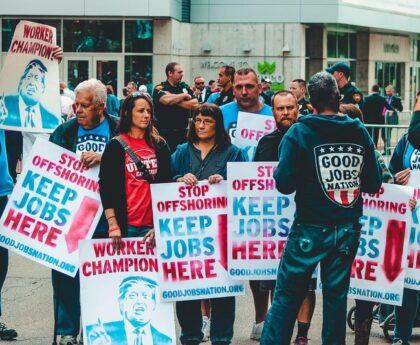- Asia faces one of worst economic outlooks in half a century, World Bank warns
- Robert Fico wins Slovakia election with anti-Ukraine stance
- Donald Trump confronts New York fraud claims on the first day of trial
- Elon Musk wades into German-Italian migration spat
- German manufacturers resist trade tensions in China’s Mittelstand enclave
- Editorial: The Fragility of Global Economies
- Advice: Navigating the Turbulent Economic Landscape
- You might want to read !
Asia faces one of worst economic outlooks in half a century, World Bank warns
The World Bank has issued a warning about Asia’s economic outlook, stating that the region is facing one of its worst economic crises in half a century. The bank’s report highlights the various challenges that Asian countries are currently grappling with, including the ongoing trade tensions between the United States and China, slow economic growth, increasing debt levels, and political uncertainties.
The COVID-19 pandemic has further exacerbated these economic challenges, leading to a sharp decline in trade and investment. The World Bank predicts that the region’s gross domestic product (GDP) is expected to contract by 2.5% in 2020, marking the first decline in the region’s GDP since the Asian financial crisis in 1997-1998.
The report also emphasizes that Asia’s recovery is contingent on effective management of the ongoing pandemic and the implementation of adequate policy measures. The World Bank highlights the importance of targeted fiscal stimulus, monetary policy support, and structural reforms to promote a sustainable and inclusive economic recovery.
Furthermore, the report underscores the need for regional cooperation and collaboration to address the economic challenges collectively. Coordination between Asian countries, including sharing best practices and jointly addressing trade tensions, can help mitigate the adverse effects of the crisis and foster a faster recovery.
It is important to note that the consequences of Asia’s economic downturn are not limited to the region itself. Given the interconnectedness of the global economy, a prolonged economic downturn in Asia could have far-reaching implications for the rest of the world.
Robert Fico wins Slovakia election with anti-Ukraine stance
The recent election in Slovakia resulted in the victory of Robert Fico, the leader of the Direction – Social Democracy (SMER-SD) party. Fico, who previously served as the country’s Prime Minister from 2006 to 2010 and again from 2012 to 2018, campaigned with an anti-Ukraine stance.
During the campaign, Fico criticized Slovakia’s position on the ongoing conflict between Ukraine and Russia, advocating for a more pro-Russian approach. He accused the previous government of blindly supporting Ukraine and neglecting Slovakia’s national interests.
Fico’s victory has raised concerns among some observers, who fear that his anti-Ukraine stance may strain Slovakia’s relationships with its European Union (EU) and NATO partners. The conflict between Russia and Ukraine remains a key geopolitical issue, and Fico’s position could have implications for Slovakia’s foreign policy and its role within the EU.
It will be crucial for Fico to carefully balance his approach and ensure that Slovakia’s foreign policy decisions align with the country’s obligations and responsibilities as an EU and NATO member. Striking the right balance between national interests and international alliances will be vital in maintaining stability within the region and fostering cooperation among European nations.
The outcome of the election also underscores the broader trend of rising nationalist sentiment in various parts of the world. The victory of Fico, who campaigned on nationalist rhetoric, reflects the growing appeal of such ideologies among certain segments of the population.
Donald Trump confronts New York fraud claims on the first day of trial
The legal battle between former President Donald Trump and the state of New York has commenced, with Trump facing fraud claims on the first day of the trial. The case centers around allegations of financial misconduct in relation to Trump’s real estate empire and his organization, the Trump Organization.
New York’s Attorney General, Letitia James, has accused Trump of inflating the value of his assets to secure loans and deflating their value for tax purposes. The charges also include claims of falsifying records and misrepresenting financial information.
This trial carries significant implications, not only for Trump, but also for the broader discussion on accountability and the rule of law. It serves as a test of the legal system’s ability to hold powerful individuals accountable for their actions, regardless of their political stature.
If the allegations against Trump are proven, it could have wide-ranging consequences for his reputation, business interests, and potential legal standing in future cases. It would also set a precedent for how financial crimes committed by public figures are dealt with.
However, it is important to note that the trial is ongoing, and Trump has repeatedly denied any wrongdoing. The outcome of the trial will ultimately depend on the evidence presented and the decision of the court.
Elon Musk wades into German-Italian migration spat
Elon Musk, the CEO of Tesla and SpaceX, has unexpectedly entered into a debate surrounding the migration policies of Germany and Italy. Musk, known for his outspokenness on social media, expressed his opinions on Twitter, sparking a discussion on the responsibilities and approaches of European countries towards migrants.
While the details of Musk’s specific comments have not been provided, his intervention highlights the increasing salience of migration as a global issue. The challenges posed by migration are multifaceted, requiring careful consideration of humanitarian, economic, and political factors.
The German-Italian migration spat reflects the broader tensions within Europe regarding migration and calls for a united and coordinated response. The influx of migrants has strained the resources and capacities of many European nations, leading to varying responses and diverging opinions on how to address the issue.
It is important for policymakers and leaders to approach migration with empathy and a commitment to finding sustainable solutions. Balancing the need to protect national interests and security with the humanitarian obligations towards migrants is a complex task, requiring careful deliberation and international cooperation.
Musk’s engagement in the debate draws attention to the role of influential figures in shaping public discourse. Their interventions, while not necessarily providing comprehensive solutions, can help raise awareness and foster dialogue on important global issues.
German manufacturers resist trade tensions in China’s Mittelstand enclave
German manufacturers, particularly those in China’s Mittelstand enclave, are facing trade tensions as a result of strained relations between China and Western countries. The Mittelstand sector, comprising small and medium-sized enterprises (SMEs), has traditionally played a significant role in Germany’s economy, known for its high-quality manufacturing and engineering expertise.
The trade tensions between China and Western countries, including the United States, have had a direct impact on German manufacturers operating in China. Disputes over intellectual property rights, market access restrictions, and technology transfers have created challenges for these companies.
Despite the difficulties, German manufacturers are displaying resilience and adaptability by investing in research and development to increase technological competitiveness and seeking new markets outside of China. This diversification strategy aims to reduce dependency on the Chinese market and mitigate the risks associated with trade tensions.
Moreover, the German government and industry associations have been actively engaged in promoting dialogue and negotiation to address trade imbalances and create a more favorable business environment. These efforts underscore the importance of diplomacy and engagement in resolving trade disputes and fostering mutually beneficial economic relationships.
It is crucial for German manufacturers, particularly those operating in China, to continue investing in innovation, embracing digital transformation, and diversifying their markets to navigate the challenging geopolitical landscape. Adapting to changing circumstances and proactively exploring new opportunities will be essential for the growth and sustainability of the Mittelstand sector.
Editorial: The Fragility of Global Economies
Recent reports from the World Bank highlight the alarming economic outlook for Asia, reinforcing the fragility of global economies in the face of ongoing challenges. The economic downturn in Asia, driven by trade tensions, slow growth, and the impact of the COVID-19 pandemic, emphasizes the interconnectedness of the global economy and the need for collective action.
The COVID-19 pandemic has exposed vulnerabilities in global supply chains and disrupted trade patterns, affecting both developed and developing economies. The World Bank’s warning serves as a reminder that no country or region is immune to economic shocks, and cooperation is crucial to mitigate their effects.
The rise of nationalist ideologies, as seen in the election victory of Robert Fico in Slovakia, further underscores the need for international cooperation. In an increasingly interconnected world, isolationism and divisive rhetoric can hinder progress and exacerbate conflicts, hindering efforts to address global challenges collectively.
The ongoing legal battle involving Donald Trump raises important questions about accountability and the rule of law. The outcome of the trial will have implications not only for Trump but also for the broader discussions on ethics, integrity, and the responsibility of leaders in upholding the principles of justice.
Migration continues to be a critical issue, demanding thoughtful and compassionate responses from policymakers. Elon Musk’s intervention highlights the potential influence of influential figures in shaping public perceptions and calls attention to the need for a comprehensive and coordinated approach to migration management.
The trade tensions faced by German manufacturers in China’s Mittelstand enclave demonstrate the vulnerability of businesses to geopolitical disputes. The resilience and adaptability displayed by these companies, combined with diplomatic efforts, highlight the importance of finding common ground and fostering favorable business environments.
Overall, the various developments discussed underscore the interconnectedness and fragility of global economies and the need for cooperation, dialogue, and ethical leadership to navigate the challenges ahead.
Advice: Navigating the Turbulent Economic Landscape
For Asian Countries:
Asian countries facing economic challenges must prioritize measures to address the ongoing crisis. Targeted fiscal stimulus, monetary policy support, and structural reforms are vital in promoting a sustainable and inclusive recovery. Coordination and collaboration among Asian countries, such as sharing best practices and jointly addressing trade tensions, can also help mitigate the adverse effects of the crisis.
For Robert Fico:
As the newly elected leader in Slovakia, Robert Fico must carefully balance his approach to Ukraine and foreign policy. Striking a balance between national interests and international alliances will be crucial for maintaining stability within the region and fostering cooperation among European nations.
For Donald Trump:
Donald Trump must diligently defend his position in the ongoing trial, as it carries significant implications for his reputation and potential legal standing. The trial serves as a test of the legal system’s ability to hold powerful individuals accountable, serving as a reminder that no one is above the law.
For policymakers dealing with migration:
Migration demands thoughtful and empathetic responses. Balancing national interests and security concerns with humanitarian obligations requires careful deliberation and international cooperation. Influential figures, such as Elon Musk, should use their platform to foster constructive dialogue and raise awareness of the complexities surrounding migration issues.
For German manufacturers:
German manufacturers operating in China’s Mittelstand enclave should prioritize diversification and innovation to reduce dependency on the Chinese market and mitigate trade tensions. Continued investment in research and development, embracing digital transformation, and exploring new markets are essential strategies for navigating the challenging geopolitical landscape.
For Global Cooperation:
The interconnectedness and fragility of global economies call for countries to work together. Encouraging dialogue, diplomacy, and ethical leadership while addressing conflicts and managing economic crises will be vital in ensuring stability and fostering inclusive growth.

<< photo by Evan Wise >>
The image is for illustrative purposes only and does not depict the actual situation.
You might want to read !
- Old Vic’s Live Aid Musical Gets Thumbs-Up from Bob Geldof
- The Power of Solidarity: Brian Cox Stands with GBP 1.25m Fund
- Stride Vows to Expedite Child Maintenance Enforcement Process: A Step Towards Ensuring Financial Security of Children?
- Navigating the Turbulence: An Overview of the Train and Tube Strikes in October 2023
- Editorial Exploration: This question is about the live results of the second week of “Strictly Come Dancing” in 2023. The title should capture the excitement and timeliness of the occasion, highlighting the outcome of the competition.
Title: “Thrilling Unveiling: Week Two Results Unleash Dazzling Victors of Strictly Come Dancing 2023”
- Billy Connolly on Parkinson’s: Navigating Modern Comedy Etiquette
- The End of an Era: Neil Warnock Departs Huddersfield Town
- “Sir Mo Farah: The End of an Era for a Running Legend”
- End of an Era: Smash Mouth’s Steve Harwell Enters Hospice Care
- Editorial Exploration: Exploring the top Prime Day deals in the UK from Amazon, John Lewis, and other retailers in 2023.
Article Title: Uncovering the Ultimate Prime Day 2023 Deals in the UK: A Comprehensive Guide to Amazon, John Lewis, and More




